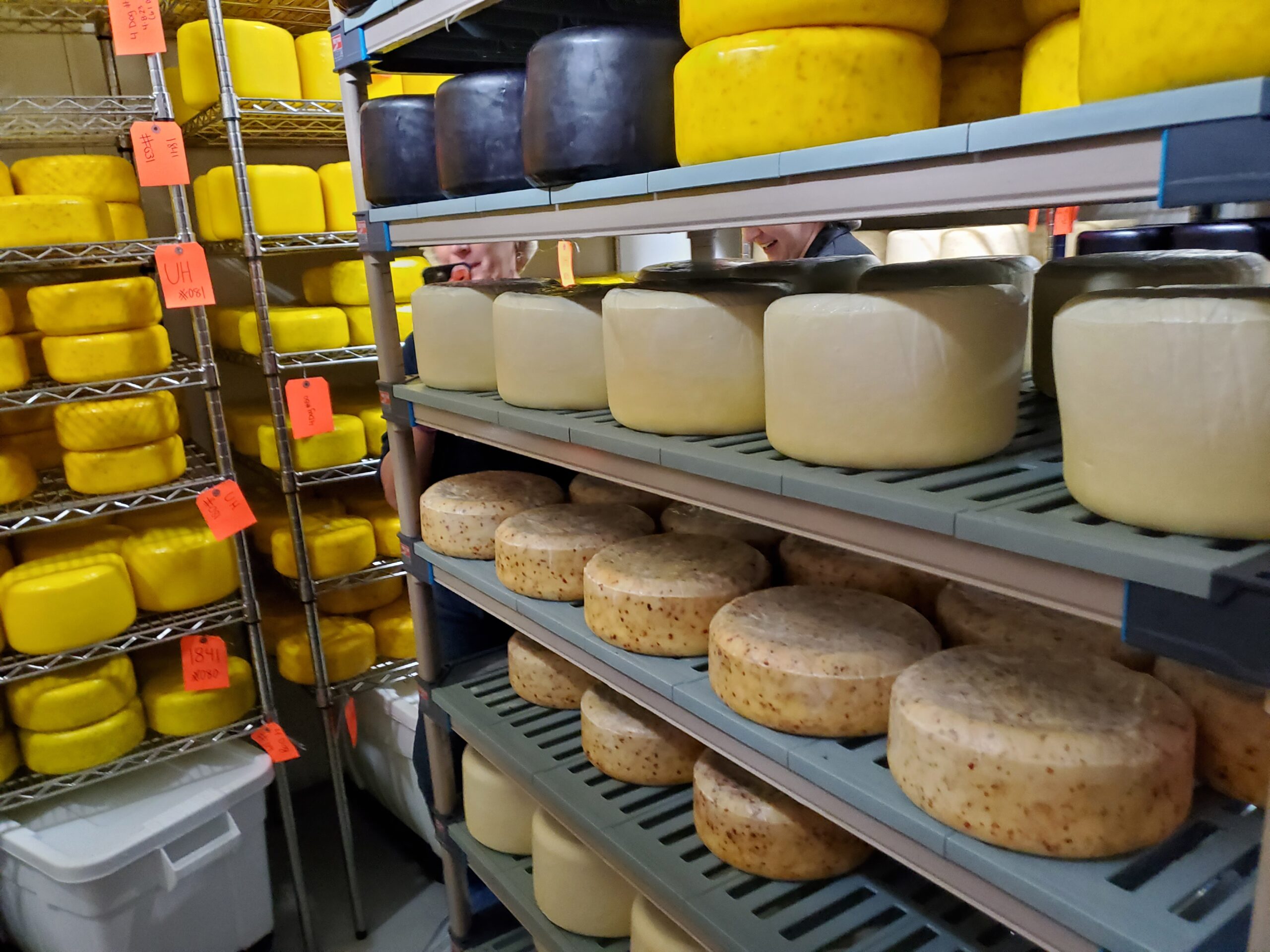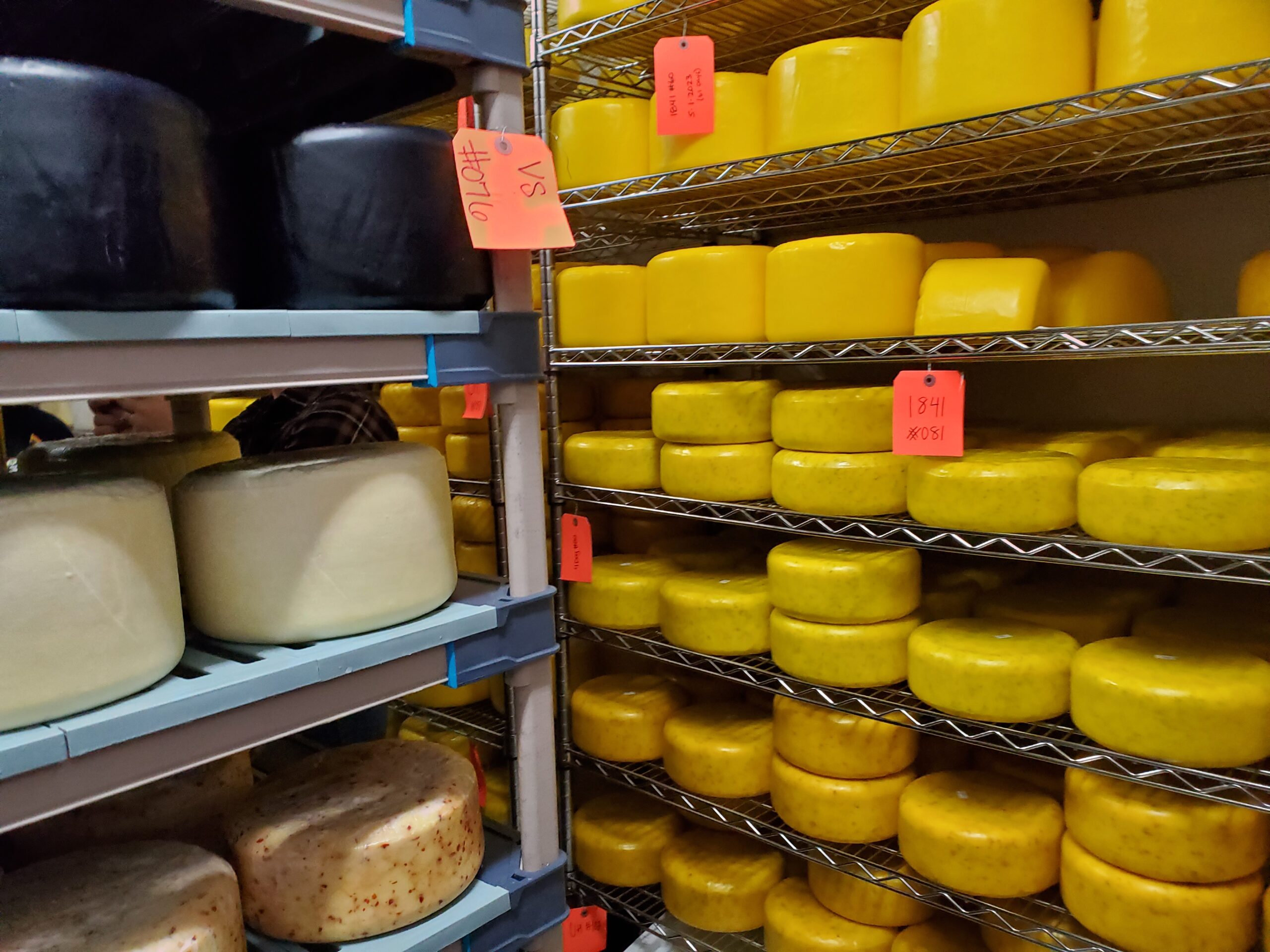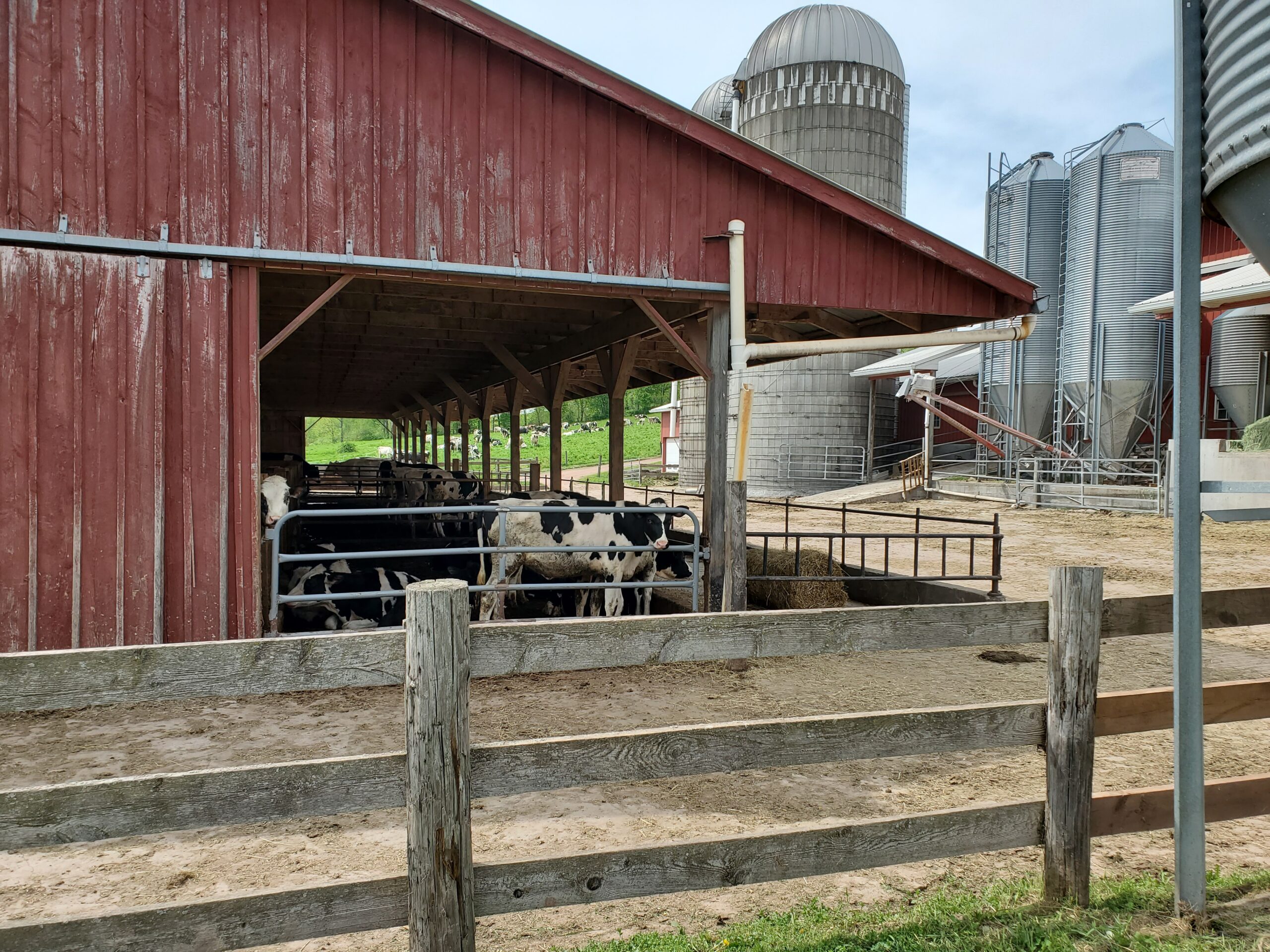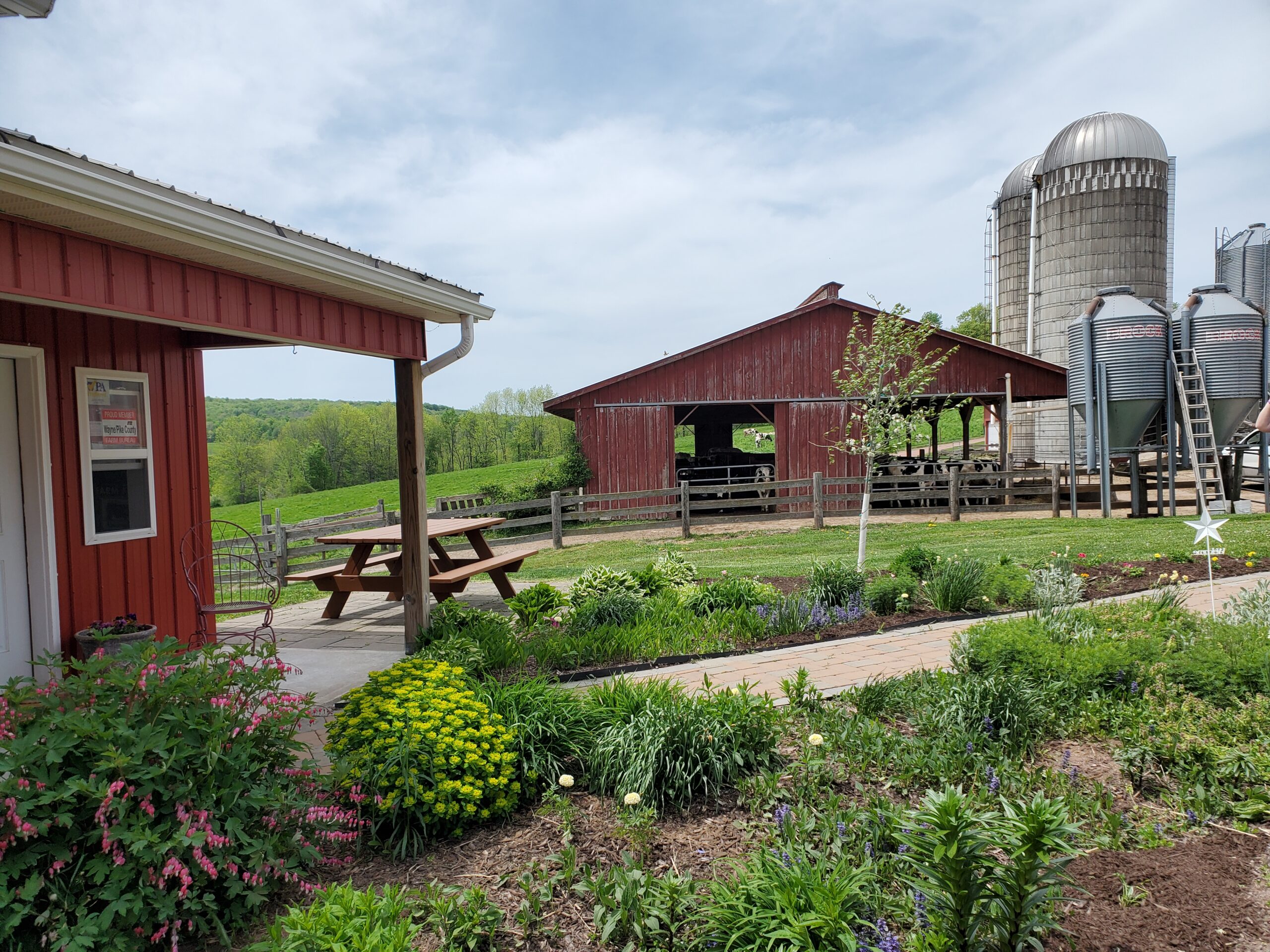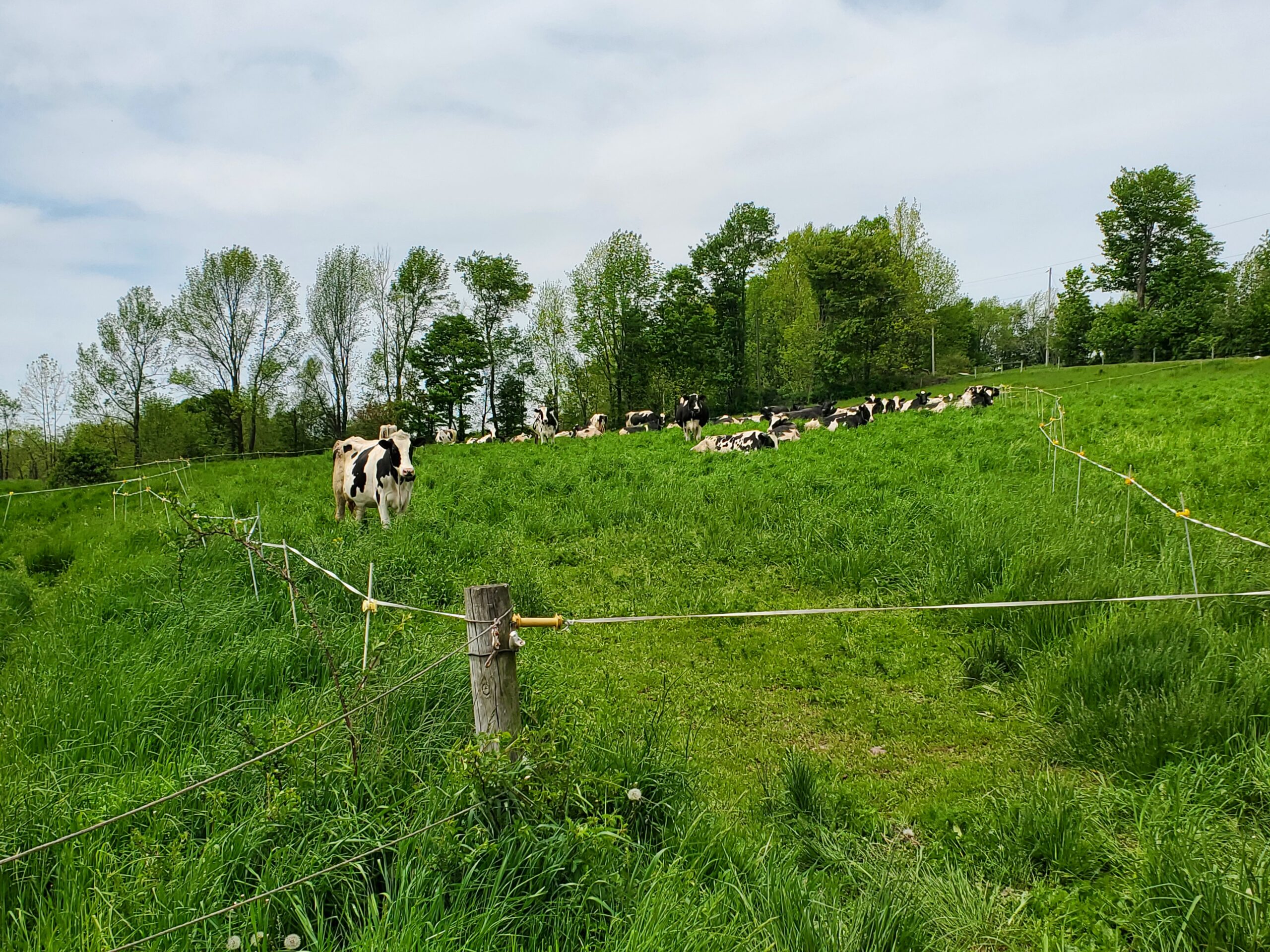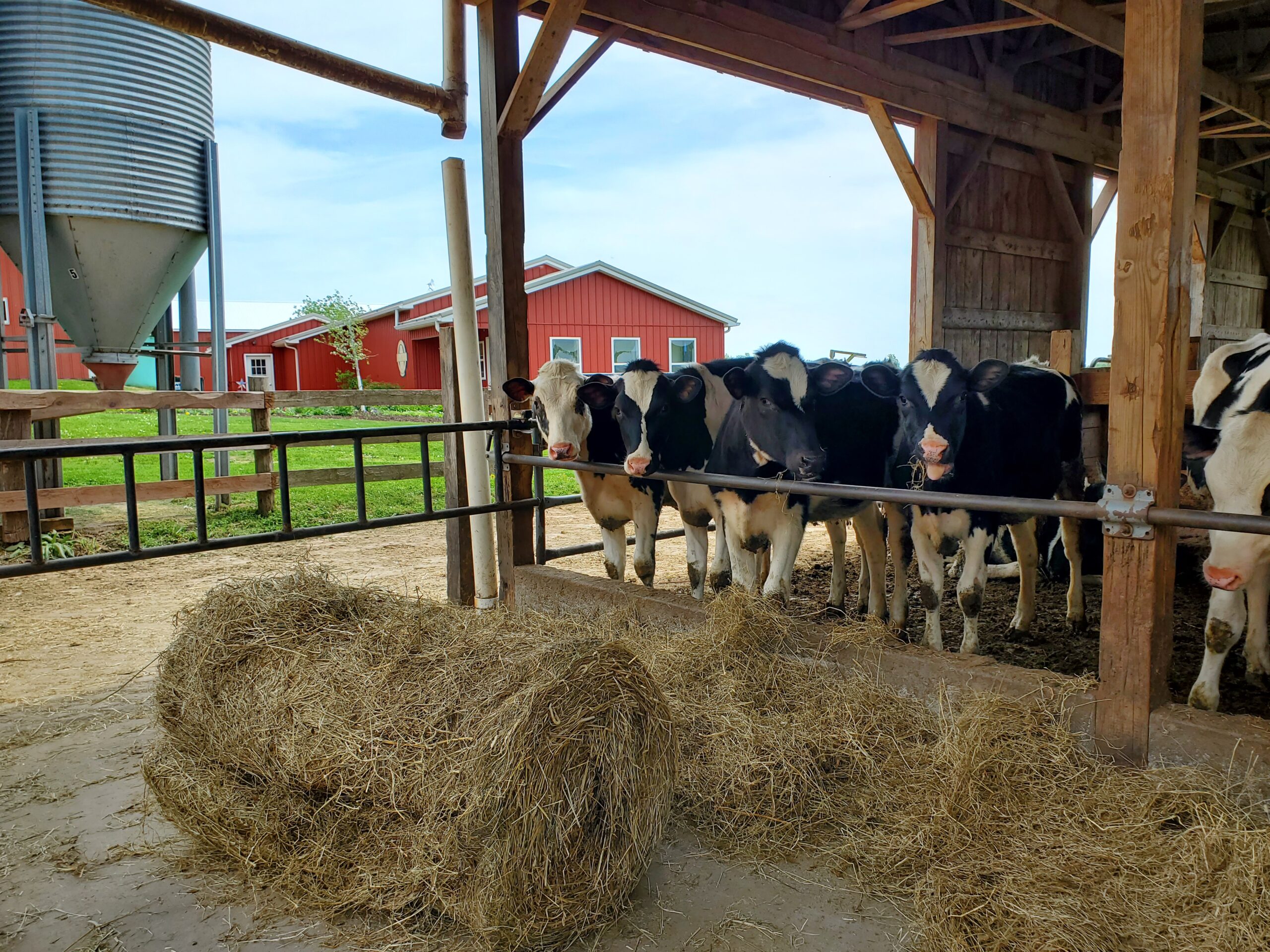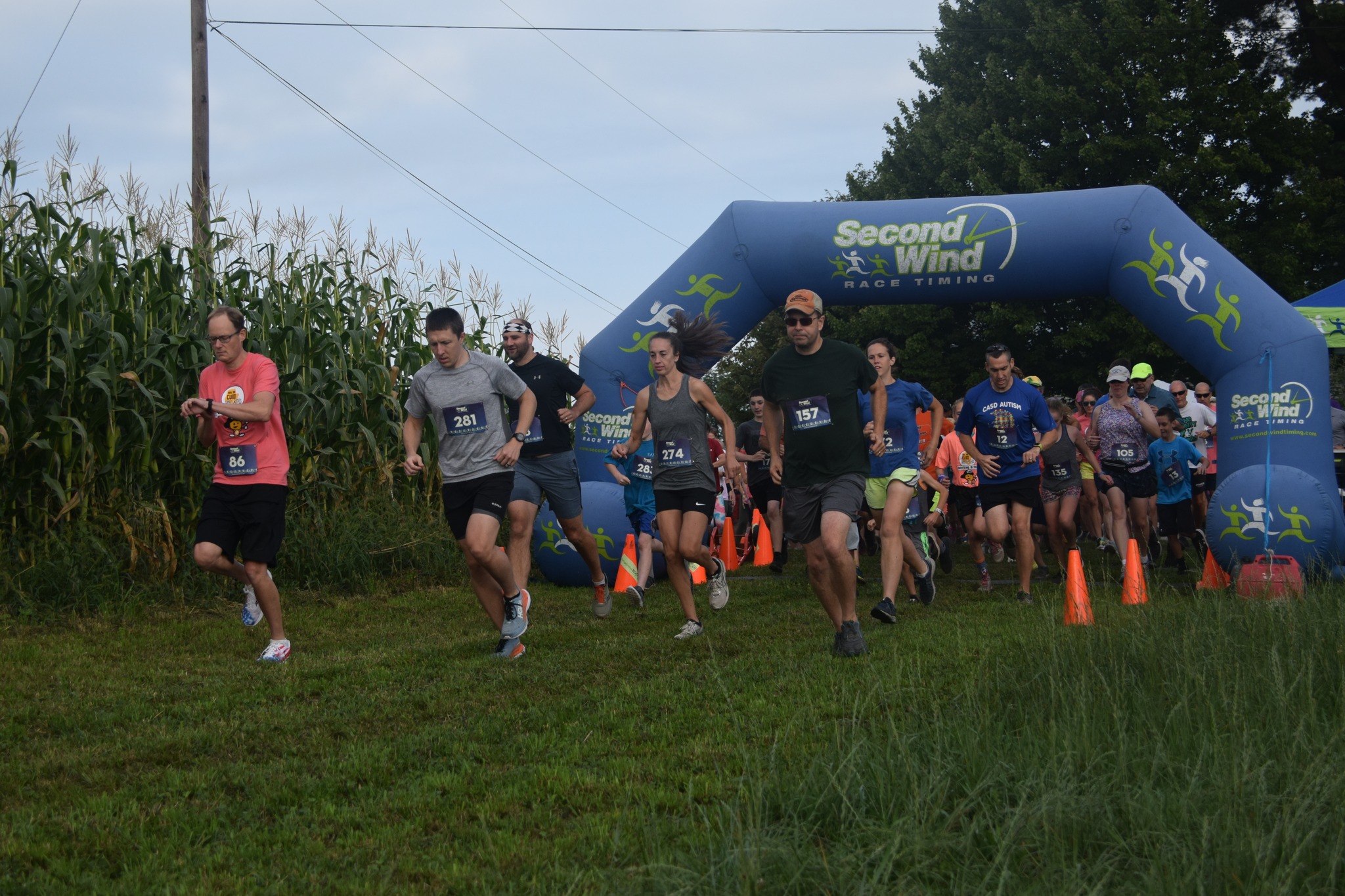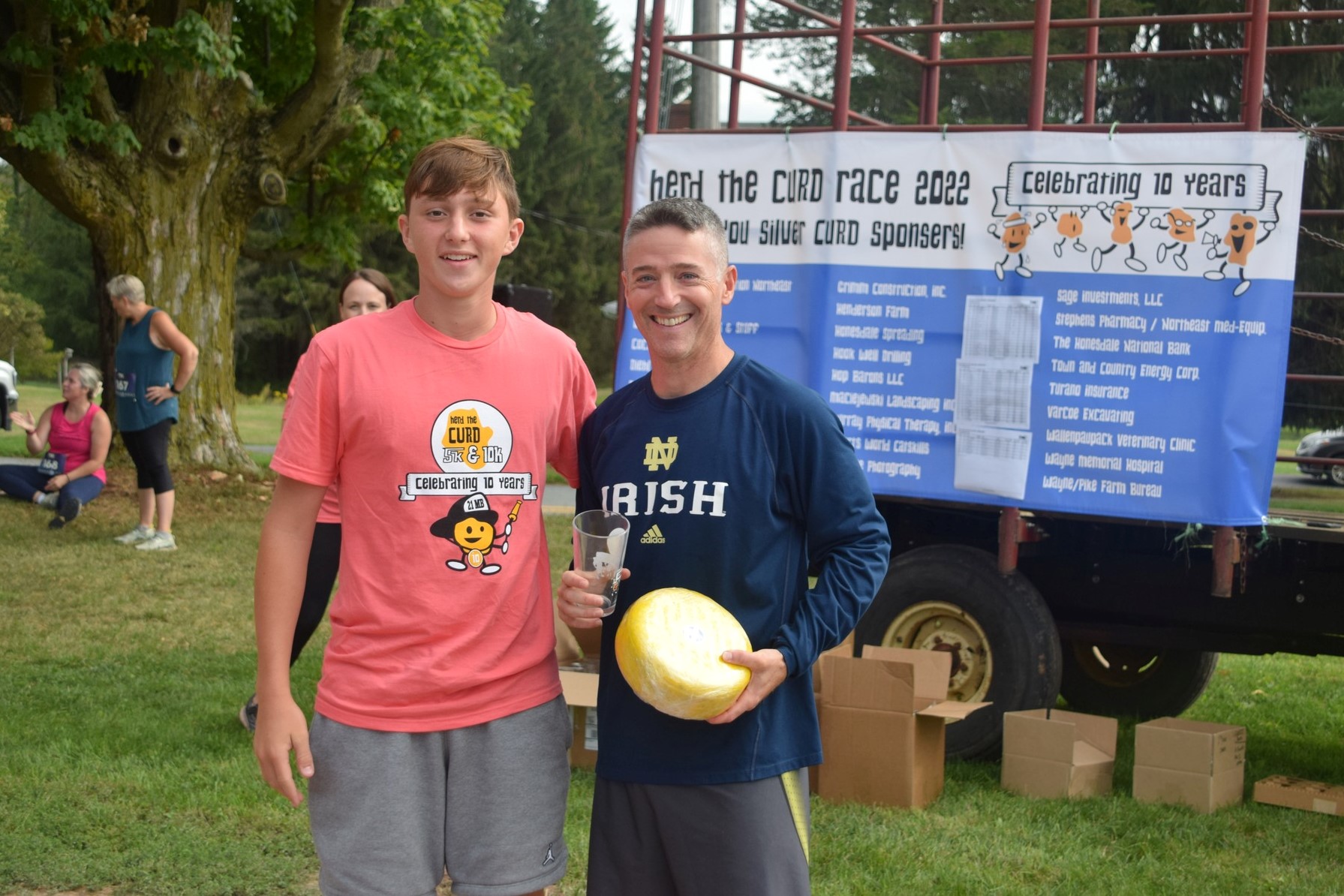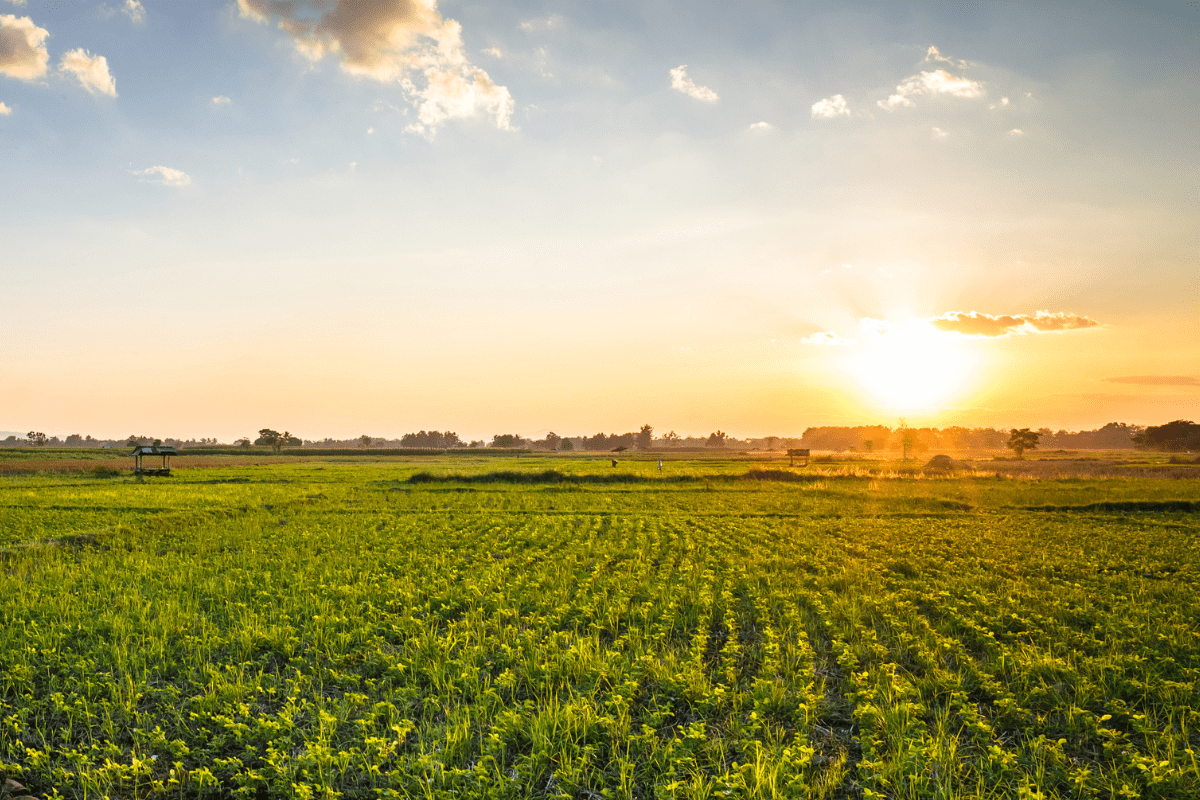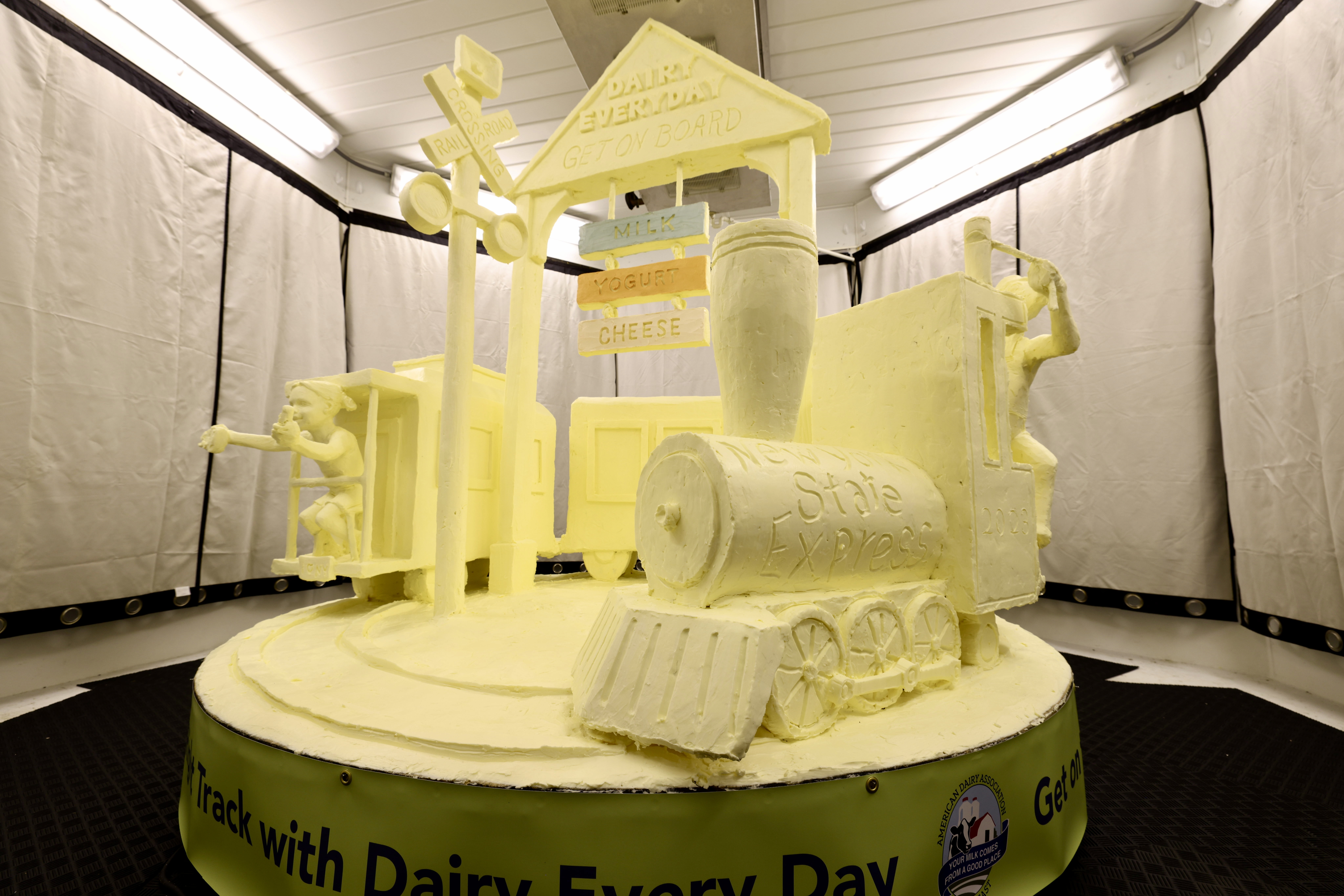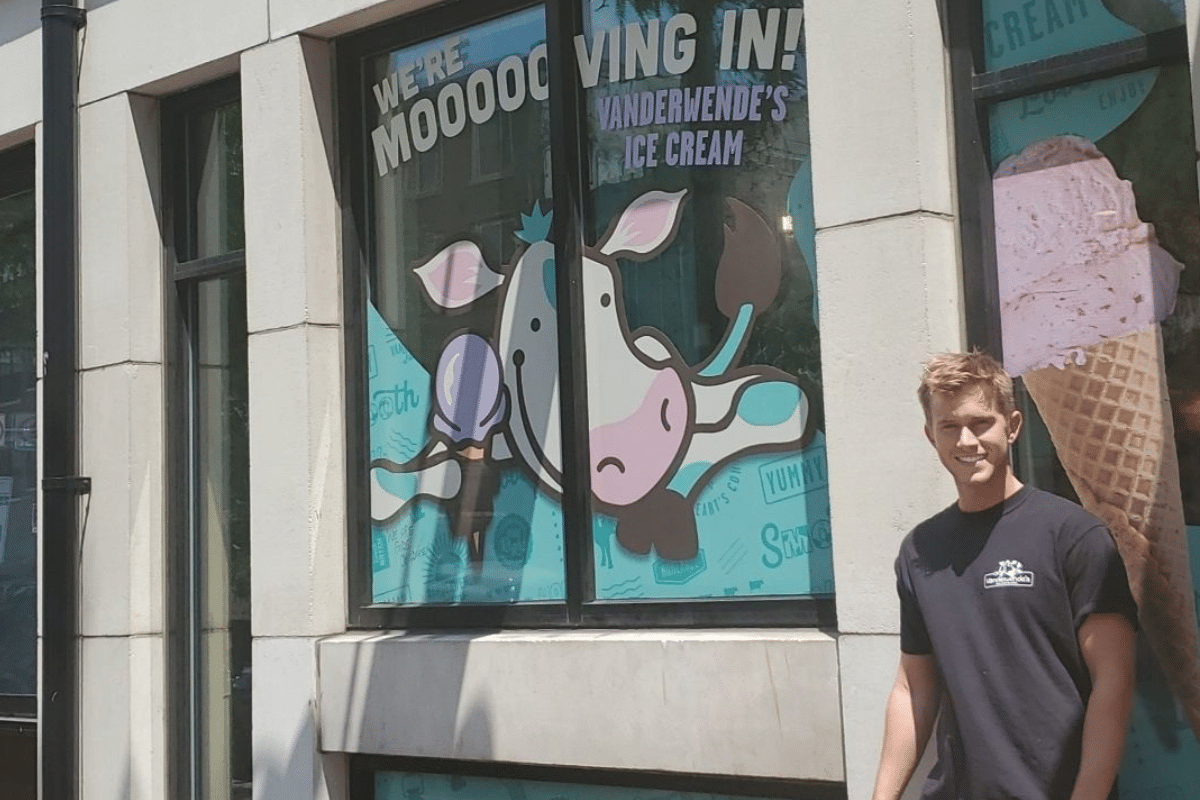Taking a natural ingredient like milk and creating an artisan cheese for people to enjoy drives Emily Montgomery’s passion for making cheese, she says.
Montgomery co-owns Calkins Creamery with her husband Jay. The couple returned to Pennsylvania from California to start their small cheesemaking business on Highland Farm, in Honesdale, a dairy owned by Bill Bryant, Emily’s dad, in partnership with Zack Bryant, her brother. It’s a family affair with Emily and Zack’s sister, Carrie Bomgardner, providing marketing support for the farm and creamery.
Beyond dairy farming and creating award-winning cheeses, the Bryant family uplifts their community through a special foundation established by Bill and Debra Bryant in memory of their son, Michael, the youngest of the Bryant’s four children. The foundation awards grants funded through an annual Herd The Curd 5k run on the farm over Labor Day weekend. For race participants, a gift of cheese curds and chocolate milk awaits them at the finish line.
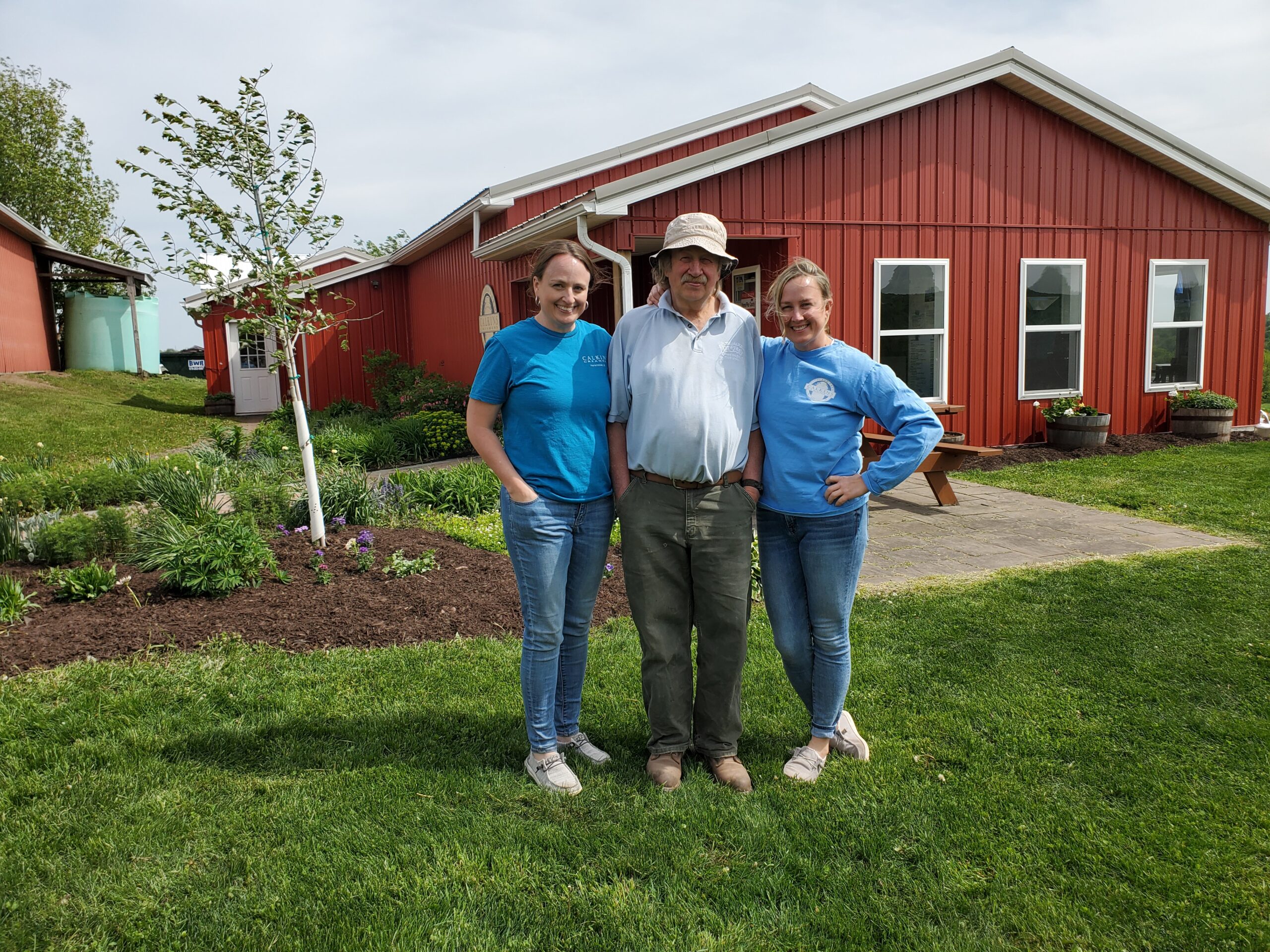
Carrie Bomgardner (left) and Emily Montgomery with their dad, Bill Bryant, at Calkins Creamery.
Calkins Creamery
Nestled in the picturesque countryside, Calkins Creamery stands as a testament to the art of cheesemaking… and taking chances. “It’s a little shoebox but you’d be amazed at what we produce there,” Emily Montgomery says of the tiny building where the cheese is made and some of it stored.
The entire cheesemaking process starts at 6 a.m., Monday through Friday, with Montgomery drawing the milk into the creamery from the family farm next door and working her cheese magic. “On a typical day we use 4,000 pounds of milk or about 465 gallons’ worth, which yields 400 pounds of cheese.” The cheesemaker makes a wide array of artisanal cheeses. “Our styles include Brie, Cheddar, Gouda, Gruyere, Havarti, Montasio, Tomme and Quark.” The natural rind cheeses, Montgomery explains, need to be flipped once a week. At least now she has help from over a dozen employees.
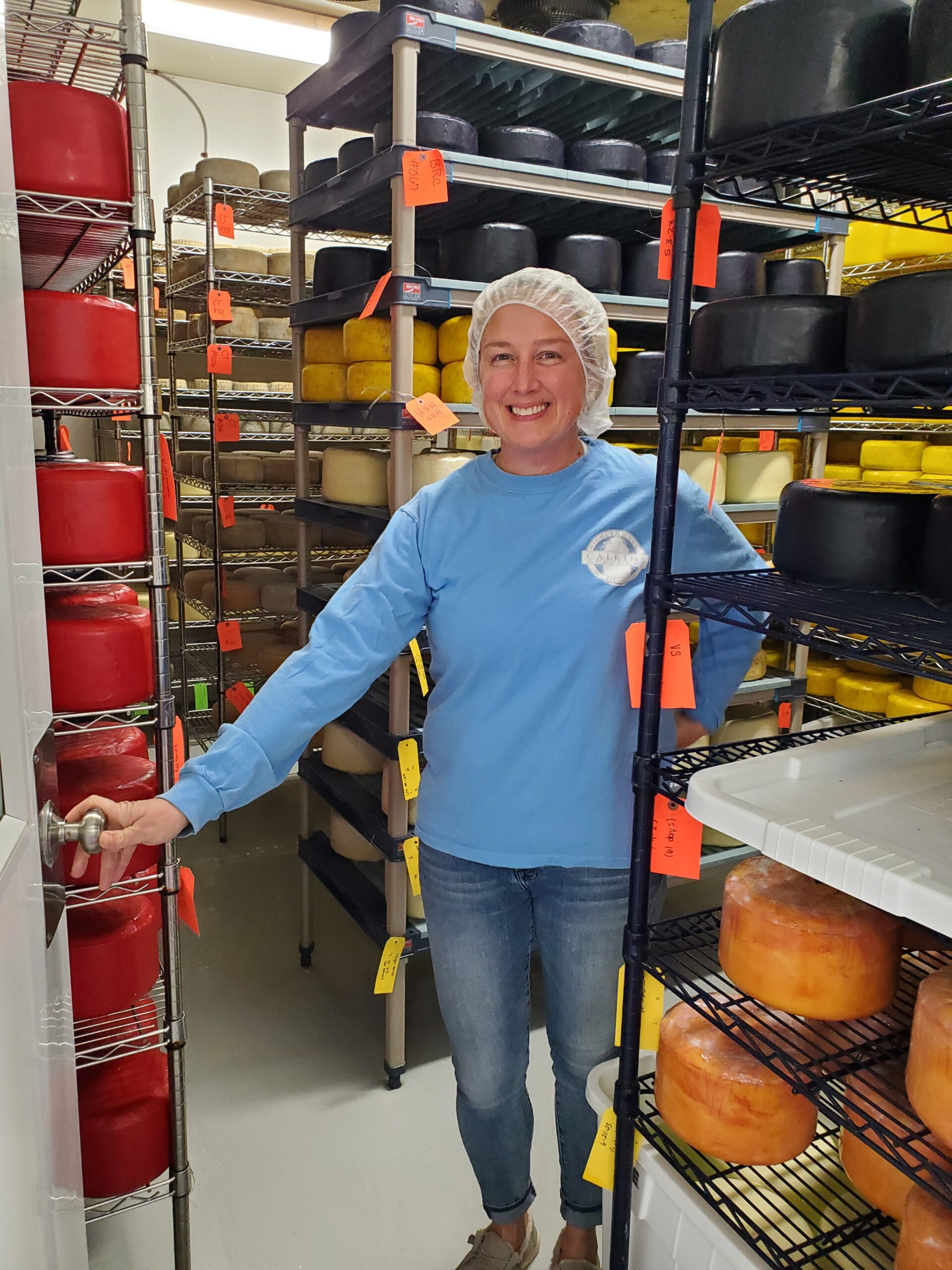
Emily Montgomery gives a tour of the cheese aging room at Calkins Creamery.
The Early Years
Emily Montgomery began making cheese in 2007. “When I first started, it was just me and a single cheese vat.” Montgomery launched the Calkins Creamery line making raw milk cheese, also known as unpasteurized cheese, which by law cannot be sold for at least 60 days. “I always say it’s a test of patience because when you’re making the cheese you wonder if the batch is going to be any good.” A second vat was later added and is used to make pasteurized cheeses that can be sold as soon as the cheese reaches its ideal ripening time. Montgomery says it took a couple of years to figure things out and work out product consistency.
Simple Ingredients
The cheesemaking process begins with heating the milk. “We heat up the milk to about 90 degrees and the key to cheesemaking is which bacteria you use.” These good bacteria or “starter cultures” break down milk’s natural sugar into lactic acid. “It impacts the flavor components and the profile of your cheese,” Montgomery says. Different cultures create different types of cheeses. “For example, Gouda uses one type of culture, while Brie and Cheddar use others,” Montgomery says. The next step adds rennet, which Montgomery says takes the cheese from a liquid state to a semi-solid state “similar to yogurt or Jell-O.” Then each cheese is given what it needs to taste its best: salt. Once the cheese is shaped and pressed, it’s aged in the cheese cave.
“When you make the cheese in the Creamery and look out to the pasture and see the cows grazing,” Montgomery says, “It makes the long days worth it and you know you are making the freshest cheese possible.”
Award-Winning Cheeses
What began as a small operation has now flourished into an entire line of award-winning cheeses. Their Brie-style Noblette clinched Calkins Creamery first-place victories in the Brie and soft-ripened cheese categories both at the renowned World Championship Cheese Contest 2020 and American Cheese Society 2019 competitions. Montgomery won first place again in the same category at the American Cheese Society 2023 competition with her Brie, Noble Road. “I really like our Brie.” Montgomery says it’s her favorite cheese to work with. “I think it’s just because I get to scoop it out, pitcher by pitcher, and spend so much time with it,” Montgomery explains. “You want it to be soft and delicate.” But what she loves most about Calkins Creamery cheese is that “it’s 100% the real deal. You just taste it and fall in love with it.” And people have. Calkins Creamery delivers their products to about 180 different retailers, from New York City to Philadelphia and Scranton, and takes online orders. As people found out about the creamery, the family opened a small store onsite.
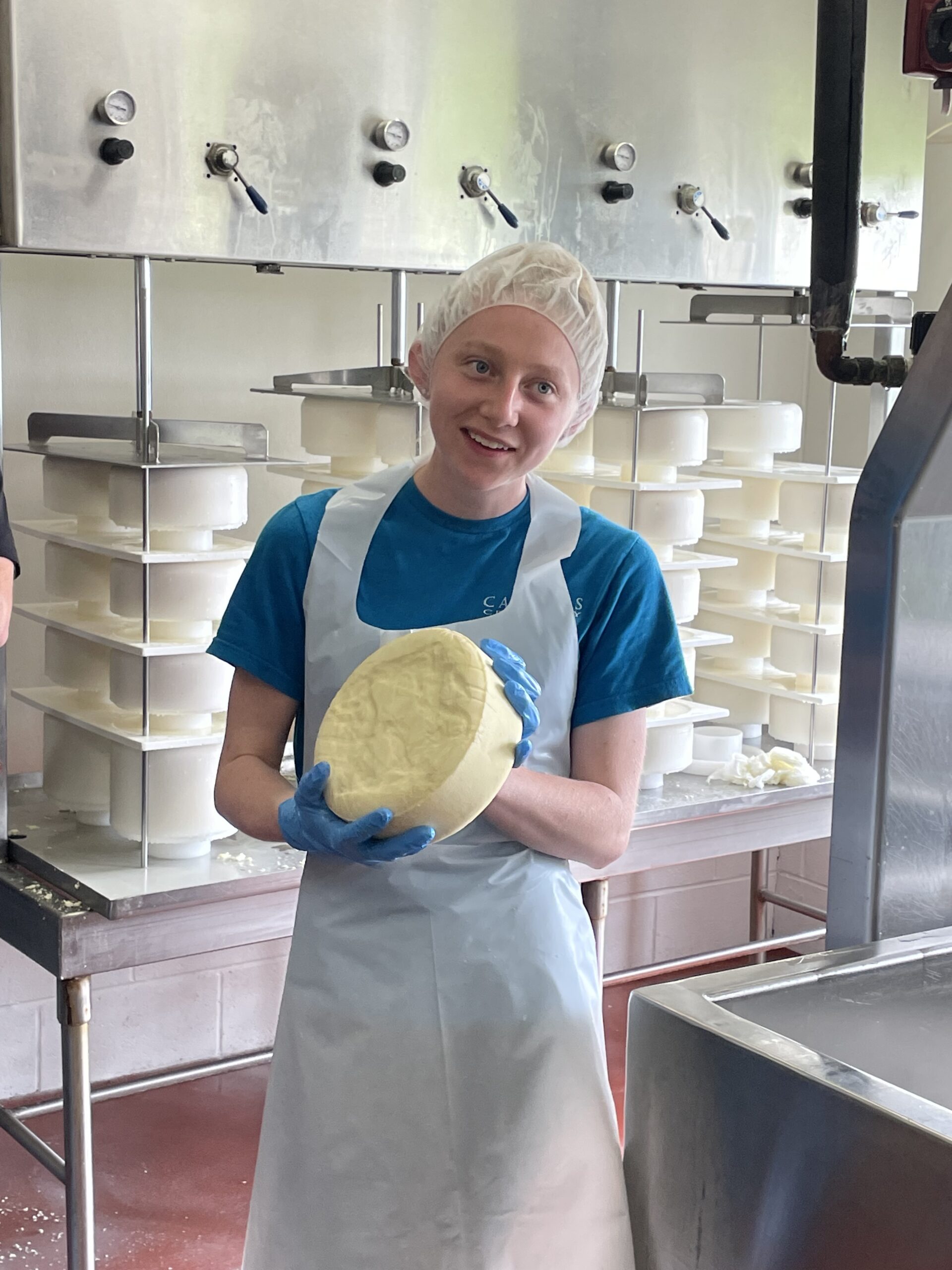
Maggie Keller, Cheese Production Specialist at Calkins Creamery, shows cheese in a cheese mold.
Highland Farms
The milk used for making Calkins Creamery cheeses comes from Highland Farm’s 80 milking Holsteins. Bill Bryant and his son Zack Bryant, a sixth-generation dairy farmer, care for the herd. “My dad and brother’s goal is to produce the highest quality milk to give us the ability to make the best artisan cheese,” says Emily Montgomery. That begins with making sure the cows are cared for and comfortable. “Cow comfort reduces stress and increases milk production and butterfat,” Montgomery says.
Bill Bryant is no stranger to caring for cows or land. He’s a fifth-generation farmer rooted in Wayne County, Pennsylvania, for more than 125 years. “Dairy farming is just in my blood,” Bryant says. He is a graduate of Cornell University with a master’s degree in agricultural and farm finance. While at Cornell, working with Dr. Howard E. Conklin, a national leader in the field of land economics, Bryant became interested in farmland preservation. With his wife, Debra, whom he met at Cornell, Bryant returned to Pennsylvania where he wanted to be part of the state’s decision-making process about land use. Bryant joined the Wayne County preservation board and more than 30 years later, he’s still serving.
This year, as Bill and Debra Bryant celebrate their golden anniversary, Bill continues to work the farm. “I do a fair amount of milking and bookkeeping. The corn is my thing,” Bryant says. The farm grows 35 acres of corn which is used as feed for the farm’s herd.
“I know what the cows are eating and that the cows are being well-cared for,” Montgomery says. “Every aspect of making cheese has been successful because of my family and our team of employees.”
Michael J. Bryant Memorial Foundation
Michael J. Bryant was a co-owner of Calkins Creamery with his siblings. He passed away in 2007, ironically in the same year Montgomery sold her first cheese notes Bomgardner. A year later, The Michael J. Bryant Memorial Fund was established in memory of the Calkins Creamery co-owner. “Mike had several challenges in his life,” Bomgardner says of her brother. “It gave him a special sensitivity to people who had such needs.” The family decided that funding grant awards to individually challenged Wayne County residents and helping local nonprofit community organizations was the best way to honor Michael. “For instance, our fund sent a woman with Down Syndrome to Disney because she always wanted to go to Disney and couldn’t afford a plane ticket.” This year, the grants awarded included helping the local 4-H club bring on sign language interpreters for two members; aiding the local high school in building a transition classroom to teach independent living skills; and, providing an elementary school with materials to build a “Sensory Pathway” to encourage student movements. The foundation is primarily funded by the families’ Annual Herd The Curd Race, held in September.
Herd The Curd Race
Each Labor Day weekend at Highland Farms, around 300 participants, runners and walkers, gather for the family’s Annual Herd The Curd 5K and 10K. “We say it’s the cheesiest race in Pennsylvania, if not the country” Carrie Bomgardner says. The race is the biggest fundraiser for the Michael J. Bryant Memorial Foundation. Herd The Curd has raised $135,000 since the race began in 2013.
“We always tell people the race is cross-country style. It’s one of the most scenic and beautiful courses, but it’s not the easiest one,” Bomgardner says. The upcoming 11th Annual Herd The Curd race is Saturday, September 2. “Dad is usually finishing up milking when the race is getting started.” And as long as there’s interest, Bomgardner says, they’ll keep doing the race. “My dad would tell you, it’s like a community ‘Welcome Home’ event. People come through and get to see the cows and the barn cats and then get some good dairy products including chocolate milk and cheese curds at the end of the race, so it’s been a win-win.”
The tenth anniversary Herd The Curd race generated $21,000 for the Michael J. Bryant Memorial Fund.
Emily’s son Rylan Montgomery (left) presents the overall 2022 5K Herd The Curd winner, Joe Murray, with his wheel of cheese award.

